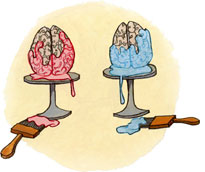
What has been especially interesting in the furor over the New Yorker cartoon (I’m sure we’ve all seen it by now–nonetheless, helpful clip to the left) is that the main focus has been on Barack Obama’s image as a Muslim terrorist and not on his wife. In some ways, this is unsurprising. After all, there’s a history of the “Obama-Osama” slip-ups–though “slip-up” gives Fox News too much credit–and he is the presidential candidate. Nonetheless, and maybe because I’ve felt already inundated with the Obama imagery, the cartoon of Michelle Obama shocked me much more. As Sophia A. Nelson writes in a superb article in the Washington Post today, the New Yorker satires an “Angela-Davis-Afro-wearing, machine-gun-toting, angry, unpatriotic Michelle Obama.” I use the word satire, because clearly it is meant to be one. At the same time, the New Yorker was willfully obtuse on this one. No virgin voyagers on the high media seas, the meta-New Yorker must have known how images can be misconstrued and used to deepen prejudice. (Just take a look at this report from Media Matters on reactions from conservative WorldNetDaily readers.)
But the Michelle Obama cartoon seemed a much more egregious satire to me. Besides a “terrorist fist bump” here and an “unpatriotic” there, I have never seen Michelle Obama painted in such a way that so clearly undermines the strong, professional, intellectual image she has maintained throughout the campaign. As Nelson points out in her article:
“Sad to say, but what Obama has undergone, though it’s on a national stage and on a much more prominent scale, is nothing new to professional African American women. We endure this type of labeling all the time. We’re endlessly familiar with the problem Michelle Obama is confronting — being looked at, as black women, through a different lens from our white counterparts, who are portrayed as kinder, gentler souls who somehow deserve to be loved and valued more than we do. So many of us are hoping that Michelle — as an elegant and elusive combination of successful career woman, supportive wife and loving mother — can change that.”
This is clearly an issue for the feminist blogger world. So here are my questions:
1. Which image were you more shocked by?
2. Do you feel that the feminist and race implications of the Michelle Obama image have been underreported?
– Kristen
Crossposted at Transitioning







